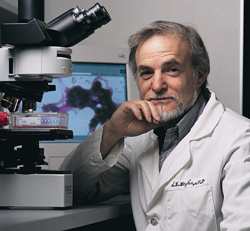May 9, 2011
Nanotech for cancer is focus of symposium
Nanotechnology has yet to be fully exploited for the diagnosis and treatment of cancer. The fifth annual symposium of the Johns Hopkins Institute for NanoBioTechnology, scheduled for Friday, May 13, aims to explore some of the ways this small-scale technology can be used to combat this dreaded disease. The event will take place from 8:30 a.m. to noon in Shriver Hall Auditorium on the Homewood campus.
Stephen B. Baylin, the deputy director of the Sidney Kimmel Comprehensive Cancer Center and the Virginia and D.K. Ludwig Professor in Cancer Research at the Johns Hopkins School of Medicine, will present the keynote address for the symposium, which begins at 9 a.m. Baylin will discuss ways nanotechnology will play a role in early cancer detection in a talk titled “Why Develop Sensitive Detection Systems for Abnormal DNA Methylation in Cancer?”
“I will discuss in my presentation the potential for use of nanotechnology-based assays for detection of cancer-specific, DNA hypermethylated genes. These are highly promising markers for cancer risk assessment, early diagnosis, molecular staging and gauging of treatment responses,” Baylin said. “Stable assay platforms, with ultimate detection sensitivity, can revolutionize the clinical use of these markers by allowing their detection in noninvasive assays such as use of DNA from blood, tissue biopsies, sputum, urine, stool and so forth. Progress in designing such tests is already evident and gives us reason to be excited about the future. This arena is a superb example of the opportunities for clinical scientists, basic cancer biologists and nanotechnology scientists to work together.”
Six other faculty experts will speak at the symposium. Also presenting from the School of Medicine are Anirban Maitra, professor of pathology and oncology; Martin Pomper, professor of radiology; Hy Levitsky, professor of oncology, medicine and urology; and Jin Zhang, associate professor of pharmacology and molecular sciences. Denis Wirtz, the Theophilus H. Smoot Professor in the Department of Chemical and Biomolecular Engineering in the Johns Hopkins Whiting School of Engineering and director of the Johns Hopkins Engineering in Oncology Center, and Gregory Longmore, a professor of medicine and oncology at the Washington University in St. Louis School of Medicine, are also giving talks.
Following the symposium, a poster session will be held from 1:30 to 3:30 p.m. in the Clipper Room of Shriver Hall. Top poster presenters can win prizes donated by INBT and symposium sponsors.
“I think attendees will be impressed with the panel of speakers that our symposium chairs [Wirtz and Maitra] have assembled. Our faculty experts possess an unparalleled depth of knowledge about both the biology and physics of cancer, as well as experience using the tools available through nanotechnology,” said INBT’s director, Peter Searson, the Joseph R. and Lynn C. Reynolds Professor in the Whiting School’s Department of Materials Science and Engineering. “We also expect the afternoon poster session to draw an array of research from across disciplines that represent the scope of cancer nanotechnology–related work occurring at Johns Hopkins. Anyone with an interest in cancer or nanotechnology should not miss this symposium.”
To register or submit a poster title for the symposium, go to inbt.jhu.edu/outreach/symposium/twentyeleven.


